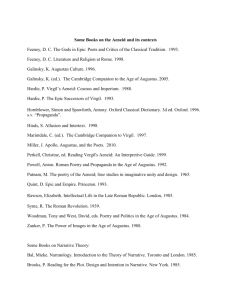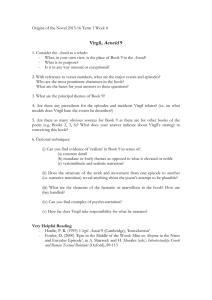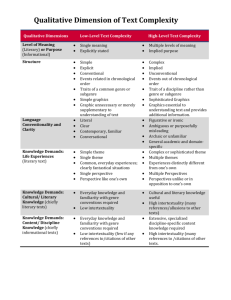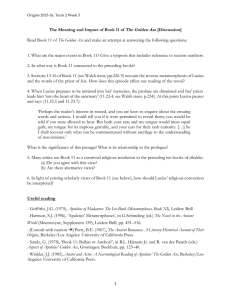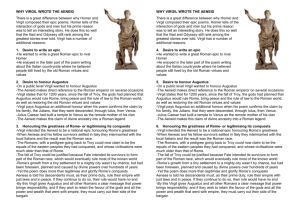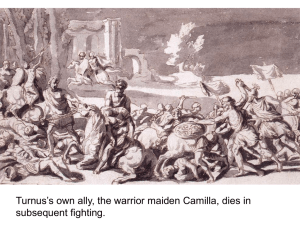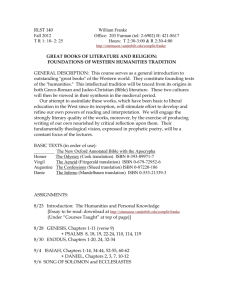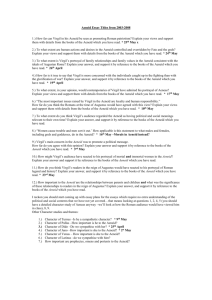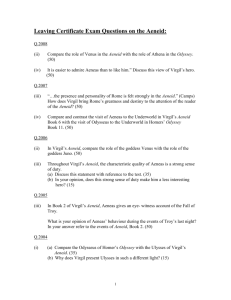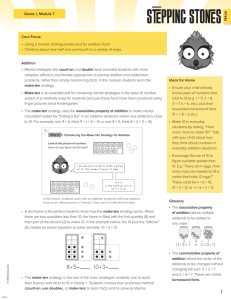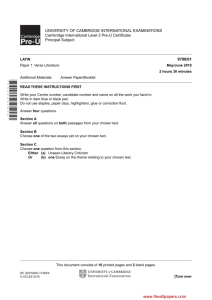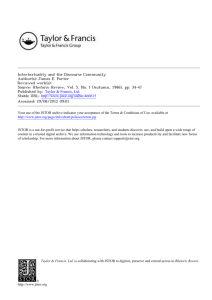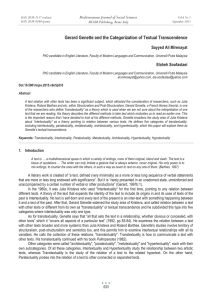Word ()
advertisement
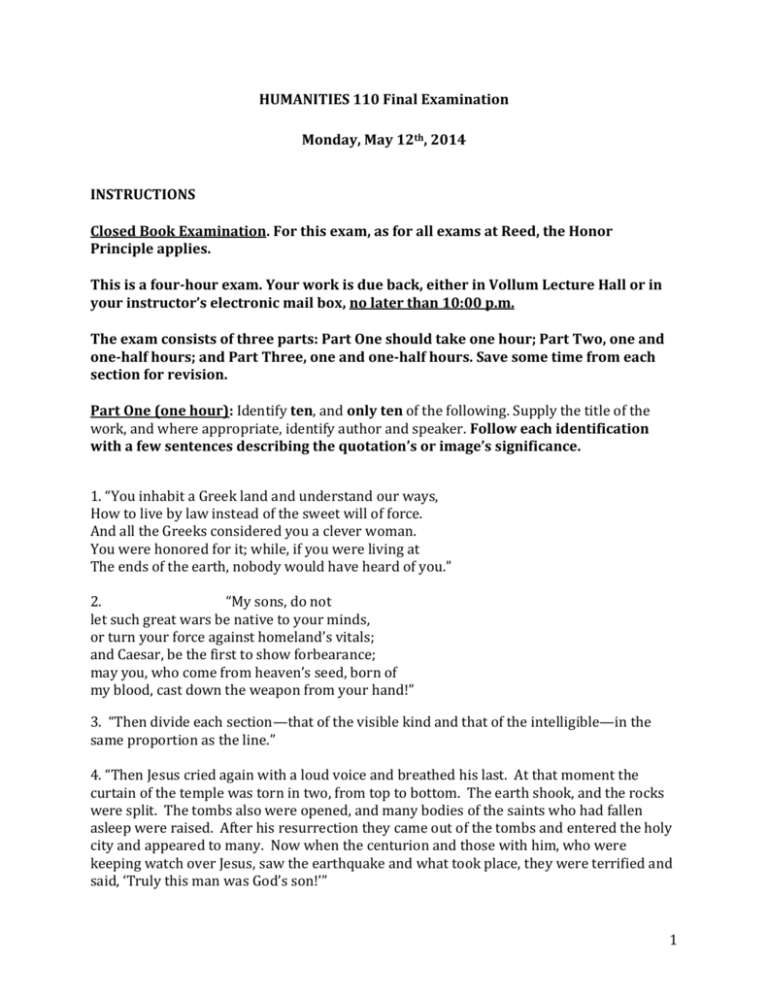
HUMANITIES 110 Final Examination Monday, May 12th, 2014 INSTRUCTIONS Closed Book Examination. For this exam, as for all exams at Reed, the Honor Principle applies. This is a four-hour exam. Your work is due back, either in Vollum Lecture Hall or in your instructor’s electronic mail box, no later than 10:00 p.m. The exam consists of three parts: Part One should take one hour; Part Two, one and one-half hours; and Part Three, one and one-half hours. Save some time from each section for revision. Part One (one hour): Identify ten, and only ten of the following. Supply the title of the work, and where appropriate, identify author and speaker. Follow each identification with a few sentences describing the quotation’s or image’s significance. 1. “You inhabit a Greek land and understand our ways, How to live by law instead of the sweet will of force. And all the Greeks considered you a clever woman. You were honored for it; while, if you were living at The ends of the earth, nobody would have heard of you.” 2. “My sons, do not let such great wars be native to your minds, or turn your force against homeland’s vitals; and Caesar, be the first to show forbearance; may you, who come from heaven’s seed, born of my blood, cast down the weapon from your hand!” 3. “Then divide each section—that of the visible kind and that of the intelligible—in the same proportion as the line.” 4. “Then Jesus cried again with a loud voice and breathed his last. At that moment the curtain of the temple was torn in two, from top to bottom. The earth shook, and the rocks were split. The tombs also were opened, and many bodies of the saints who had fallen asleep were raised. After his resurrection they came out of the tombs and entered the holy city and appeared to many. Now when the centurion and those with him, who were keeping watch over Jesus, saw the earthquake and what took place, they were terrified and said, ‘Truly this man was God’s son!’” 1 5. 6. “Its first principle will take its starting point for us as follows: nothing ever comes to be from nothing through divine intervention. The reason that fear so dominates all mortals is because they see many things happen on earth and in the heavens the causes of whose activities they are able in no way to understand, and they imagine they take place through divine power.” 7. “This upheaval, as I said, was the greatest of all time; and when it occurred Rome herself was in a most unsettled state. Jewish revolutionaries took advantage of the general disturbance; they had vast resources of men and money; and so widespread was the ferment that some were filled with hope of gain, others with fear of loss, by the state of affairs in the East; for the Jews expected all their Mesopotamian brethren to join their insurrection.” 8. “Now fine and just things, which political science investigates, differ and vary so much as to seem to rest on convention only, not on nature. But goods also vary in the same way, because they result in harm to many people – for some have been destroyed because of their wealth, others because of their bravery. And so, since this is our subject and these are our premises, we shall be satisfied to indicate the truth roughly and in outline; since our 2 subject and premises are things that hold good usually [but not universally], we shall be satisfied to draw conclusions of the same sort.” 9. “I used to be a farmer—the sweetest life on earth, a lovely, moldy, unspruce, litter-jumbled life, bursting with honeybees, bloated with sheep and olives.” 10. “So everyone ought to have the same purpose: to identify the interest of each with the interest of all. Once men grab for themselves, human society will completely collapse. But if nature prescribes (as she does) that every human being must help every other human being, whosoever he is, just precisely because they are all human beings, then — by the same authority — all men have identical interests. Having identical interests means that we are all subject to one and the same law of nature: and, that being so, the very least that such a law enjoins is that we must not wrong one another. This conclusion follows inevitably from the truth of the initial assumption.” 11. “Then the Jews said to him, ‘You are not yet fifty years old, and have you seen Abraham?’ Jesus said to them, ‘Very truly, I tell you, before Abraham was, I am.’” 12. “The Romans, on the other hand, although they have arrived at the same result as regards their form of government, did not do so by means of abstract reasoning, but rather through the lessons learned from many struggles and difficulties; and finally, by always choosing the better course in the light of experience acquired from disasters, they have reached the same goal as [the Spartan lawgiver] Lycurgus, that is, the best of all existing constitutions.” 13. “Both work in haste, their dresses girdled tight Below their breasts; the movements of their arms Are skilled and sure; their zeal beguiles their toil Here purple threads that Tyrian vats have dyed Are woven in, and subtle delicate tints That change insensibly from shade to shade.” II. Part Two (one and one-half hours): Write an essay on one of the following topics: 1. Explain the relationship between virtue and constitution that informs the understanding of political excellence in three of the following, pointing out similarities and differences. Select at least one from each group: a. Plato’s Republic, Aristotle’s Nicomachean Ethics/Politics b. Polybius’s Histories, Livy’s The Rise of Rome, Augustus’s Res Gestae or Suetonius’s Life of Augustus 3 2. In Politics Aristotle states that the city “remains in existence for the sake of living well.” Compare and contrast three of the following texts (at least one from each group), in terms of the significance they assign to the city. How do they represent the city and/or the connection between the individual and the city? To what extent and how does each text support or contest Aristotle’s connection between the city and good living? a. Theocritus’s Idylls, Lucretius’s On the Nature of Things, Livy’s The Rise of Rome, Virgil’s Aeneid, Augustus’s Res Gestae b. Josephus’s The Jewish War, The Gospel According to Matthew or The Gospel of John, Apuleius’s The Golden Ass III. Part Three (one and one-half hours): Write an essay on one of the following topics: 1. Metamorphosize literally means boundary (meta) + form/shape (morph) + to make/become (ize). Using three texts we have read this semester, discuss the extent to which physical or mental transformations reinforce or subvert boundaries (political, religious, cultural, or of literary genre). Texts could include, but are not limited to Apuleius’s The Golden Ass, Ovid’s Metamorphoses, Josephus’s The Jewish War, Virgil’s Aeneid, and The Gospel According to Matthew. 2. In The Theory of the Novel Georg Lukacs argues that “The...hero of the novel is the product of estrangement from the outside world,” whereas the hero of the epic, “as bearer of his destiny, is not lonely, for his destiny connects him by indissoluble threads to the community whose fate is crystallized in his own.” Using Apuleius's The Golden Ass, Ovid's Metamorphoses, and Virgil's Aeneid argue for or against Lukacs's claim. 3. “Intertextuality” is a term scholars use to refer to the ways in which texts borrow from each other, build on each other, or speak to each other. Analyze how three texts (these can include visual works) from the spring syllabus employ intertextuality. Your essay should show how intertextuality is used in specific political/social/cultural contexts to have particular effects on readers or viewers. 4
